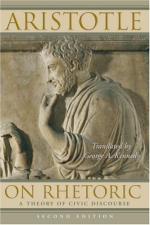
|
| Name: _________________________ | Period: ___________________ |
This quiz consists of 5 multiple choice and 5 short answer questions through Book III, Chapter 10-12.
Multiple Choice Questions
1. How were antithesis sayings defined by Aristotle?
(a) The grouping of two similar qualities.
(b) The reference to three slightly different ideas.
(c) The reference to three vastly different ideas.
(d) The grouping of two opposite qualities.
2. Which one of the following would be an example of amplification?
(a) The effective results of a previous political plan.
(b) The unintended effects of a political plan.
(c) The positive effects of a political plan.
(d) The ineffective results of a political plan.
3. In Aristotle's description of fear, what was the opposite of fear?
(a) Confidence.
(b) Ability.
(c) Knowledge.
(d) Friendship.
4. In Aristotle's opinion, which things did a criminal consider when choosing their victim?
(a) Vulnerability, value, and convenience.
(b) Value and convenience.
(c) Vulnerability and value.
(d) Vulnerability and convenience.
5. As explained by Aristotle in Book III, Chapter 10, how should effective prose express its important points?
(a) With elegant, extravagant sayings.
(b) With succinct, extravagant, elegant sayings.
(c) With succinct, elegant sayings.
(d) With succinct, extravagant sayings.
Short Answer Questions
1. Using an example of the similarities or differences between parents and their children, how did Aristotle describe Socrates' children?
2. When did Aristotle think "what is good" made one happy?
3. Although a refutative enthymeme might be more effective in a certain sense, how did Aristotle describe all enthymemes?
4. With the ethical appeal, what would the speaker be attempting to convey to the audience?
5. As explained in Book II, Chapter 4, what type of friends were people most likely to choose?
|
This section contains 300 words (approx. 1 page at 300 words per page) |

|




